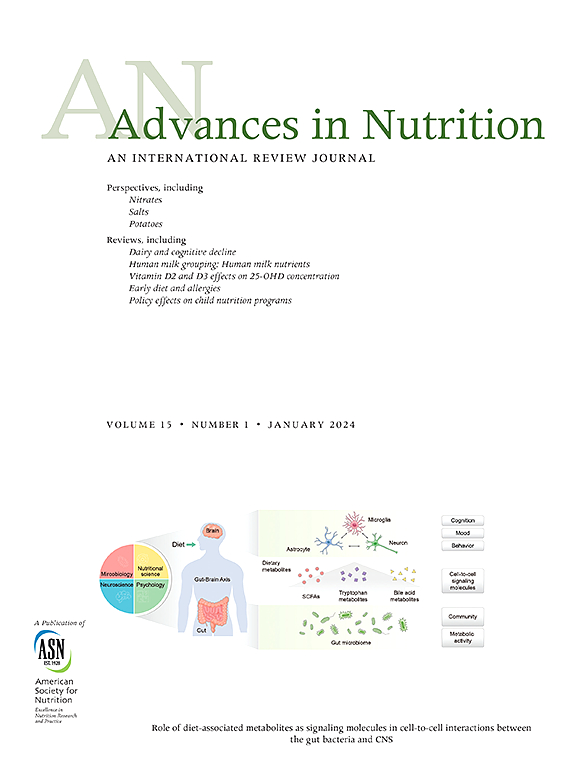孕妇依从性对妊娠期间补充多种微量营养素的影响:一项系统综述和个体参与者数据荟萃分析。
IF 9.2
1区 医学
Q1 NUTRITION & DIETETICS
引用次数: 0
摘要
与单独补充叶酸铁(IFA)相比,孕期补充多种微量营养素(MMS)可降低婴儿低出生体重(LBW)的风险,并改善其他母婴结局。然而,在现实项目中,起始时间和依从性对MMS有效性的影响尚不清楚。为了解决这个问题,我们进行了一项两阶段的个体参与者数据荟萃分析,包括15项随机试验(61204名孕妇),并评估MMS的相对效果是否存在以下差异:依从性与起始胎龄相结合;以及服用的药片总数。我们还评估了这些因素与MMS患者预后的观察性关联。与IFA相比;依从性越高,MMS对连续出生体重主要结局的相对影响越大(相互作用的p值)本文章由计算机程序翻译,如有差异,请以英文原文为准。
Contribution of Maternal Adherence to the Effect of Multiple Micronutrient Supplementation During Pregnancy: A Systematic Review and Individual Participant Data Meta-analysis
Multiple micronutrient supplements (MMS) in pregnancy reduces risk of infant low birthweight (LBW) and improves other maternal and infant outcomes compared with iron and folic acid (IFA) supplements alone. However, the impact of timing of initiation and adherence on the MMS effectiveness in real-world programs remains unclear. To address this, we conducted a 2-stage individual participant data meta-analysis that included 15 randomized trials (61,204 pregnant women) and assessed whether the relative effect of MMS differed by the following: adherence alone; adherence in combination with gestational age at initiation; and the total number of tablets taken. We also evaluated the observational association of these factors with outcomes among participants who received MMS. Compared with IFA supplements, the relative effect of MMS on the primary outcome of continuous birthweight was greater with higher adherence (P-interaction < 0.05). Among women who took ≥90% of supplements, MMS increased birthweight by 56 g (95% CI: 45, 67 g), whereas among women who took <60% of supplements, there was no difference in birthweight between MMS and IFA supplements [mean difference (MD): 9 g; 95% CI: −17, 35 g). Higher adherence was also associated with greater effect of MMS on LBW and birthweight-for-gestational age centile and women who took more supplements experienced a greater relative impact of MMS on birthweight-for-gestational age centile and small-for-gestational age births (SGA) as compared with IFA supplements. Observational analyses among participants who received MMS showed that ≥90% adherence was associated with increased birthweight (MD: 44 g; 95% CI: 31, 56 g) and lower risk of LBW [relative risk (RR): 0.93 g; 95% CI: 0.88, 0.98 g] and small-for-gestational age (RR: 0.95; 95% CI: 0.93, 0.98), whereas <75% adherence was associated with greater risk of stillbirth (RR: 1.43; 95% CI: 1.12, 1.83) and maternal anemia (RR: 1.26; 95% CI: 1.11, 1.43) than 75%–90% adherence. Programs should invest in strategies that promote early initiation and high adherence to MMS.
This trial was registered at PROSPERO as CRD42022319207.
求助全文
通过发布文献求助,成功后即可免费获取论文全文。
去求助
来源期刊

Advances in Nutrition
医学-营养学
CiteScore
17.40
自引率
2.20%
发文量
117
审稿时长
56 days
期刊介绍:
Advances in Nutrition (AN/Adv Nutr) publishes focused reviews on pivotal findings and recent research across all domains relevant to nutritional scientists and biomedical researchers. This encompasses nutrition-related research spanning biochemical, molecular, and genetic studies using experimental animal models, domestic animals, and human subjects. The journal also emphasizes clinical nutrition, epidemiology and public health, and nutrition education. Review articles concentrate on recent progress rather than broad historical developments.
In addition to review articles, AN includes Perspectives, Letters to the Editor, and supplements. Supplement proposals require pre-approval by the editor before submission. The journal features reports and position papers from the American Society for Nutrition, summaries of major government and foundation reports, and Nutrient Information briefs providing crucial details about dietary requirements, food sources, deficiencies, and other essential nutrient information. All submissions with scientific content undergo peer review by the Editors or their designees prior to acceptance for publication.
 求助内容:
求助内容: 应助结果提醒方式:
应助结果提醒方式:


